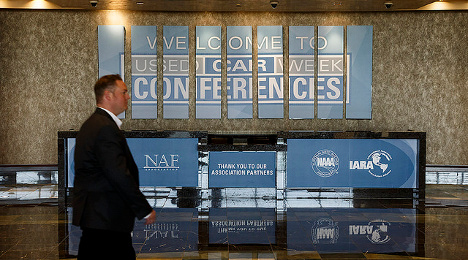Before the year closed, Reynolds and Reynolds added to its collection of libraries of standardized, legally reviewed finance and insurance (F&I) documents for dealers while a subprime finance company serving the Midwest — U Drive Acceptance — moved into new offices.
Furthermore, FICO is looking to help finance companies begin 2017 successfully by dissecting alternative deal structures through a free webinar.
In late December, Reynolds released the Reynolds LAW Montana F&I Library. That announcement came on the heels of the company rolling out the Reynolds LAW Oklahoma F&I Library as well as the Reynolds LAW New York F&I Library.
“The documents in the (libraries) are designed to help dealers meet compliance obligations and manage risk,” said Jerry Kirwan, senior vice president and general manager of Reynolds Document Services. “At the same time, because the documents in the library are written in consumer-friendly language, they can help dealers to establish a clearer, more efficient F&I process. A more efficient F&I process can help lead to a better overall customer experience with the dealership.
"Since regulatory scrutiny is an ongoing concern for automotive retailers, the (library) is a tool to help dealers better meet compliance obligations and manage risk,” Kirwan continued. “Using standard documents written in consumer-friendly language can help to create a clearer, more consistent, and more efficient F&I process for the F&I manager and for the consumer.”
Kirwan also noted that the documents in the library are regularly reviewed for legal sufficiency with the latest automotive regulations by Reynolds’ forms specialists alongside Reynolds’ outside legal partners.
The printed documents in the resources for Montana, Oklahoma and New York also are available in a digital format, which can help facilitate the conversion to laser-printed transactions and e-contracting. Reynolds Document Services maintains licensing agreements with all major providers of electronic F&I (e-F&I) solutions.
Steven Rankin, president of the Oklahoma Automobile Dealers Association, added, “The Oklahoma Automobile Dealers Association aims to protect and support the business interests of Oklahoma car and truck dealers.
“We are happy to share the LAW Oklahoma F&I Library with our dealers because it is designed to help them maintain compliance, improve day-to-day F&I operations, and improve the experience of buying a car or truck for their customers,” Rankin went on to say.
Now with Montana, Oklahoma and New York in the offering portfolio, other states where Reynolds resources are available include: Alabama, Arizona, Arkansas, California, Colorado, Georgia, Hawaii, Idaho, Illinois, Indiana, Kentucky, Louisiana, Maryland, Massachusetts, Michigan, Missouri, Nevada, New Jersey, New Mexico, North Carolina, Ohio, Oregon, Pennsylvania, South Carolina, Tennessee, Texas, Utah, Virginia, Washington, West Virginia and Wyoming.
U Drive Acceptance moves into new space
U Drive Acceptance (UDAC) recently shifted its operation into a new office at 1119 Historic Fourth in downtown Sioux City, Iowa. UDAC is a subprime finance company founded by president Brian Berkenpas and specializes in providing financial solutions to independent and franchised dealers and their customers.
UDAC currently operates in Iowa, South Dakota, Minnesota and Missouri with plans to expand into other Midwest states in the near future.
Since 2013, UDAC has been sharing office space with its affiliated dealership, Big Deal Auto Plaza.
“Our growth has been beyond what had been forecasted. With all of the new technology we have implemented, it was time to make the separation,” UDAC vice president Neil Evans said.
UDAC leverages the technology provided by Creditsmarts to facilitate originations. UDAC chief financial officer Jeremy Bennett explained the importance.
“Our new LOS (loan origination system) has allowed us to go from working three different platforms to only one, which increases our efficiencies dramatically,” Bennett said. “We have been able to stream line our approval process through automation which allows our dealers to get approvals in a matter of seconds on one out of every four applications.”
Creditsmarts national lender sales manager Chad Simmons added, “When U Drive made the move to become an indirect lender, we were very pleased that they selected us for their LOS services. It has been our pleasure to work with Jeremy and Neil as well their team. We are excited to be a part of their growth and bright future.”
For more information, visit www.udriveac.com.
FICO webinar on alternative deal structures
FICO is offering a free educational webinar focused on how to use predictive analytics and optimization to generate alternative deal structures.
The session set for 1 p.m. ET on Jan. 19 will be orchestrated by FICO global analytic segment leader Matt Stanley and Ken Kertz, FICO’s practice leader, auto and motorized.
Stanley and Kertz intend to elaborate about how this approach can eliminate “rehashing” while facilitating regulatory compliance as well as increasing profitability by reducing the perceived need to underprice the competition along with enhanced customer satisfaction.
“When car dealerships have interested customers who are ready to purchase vehicles, nothing is more frustrating than struggling to structure the right deals — ones that maximize profitability, fit the risk parameters of the lender and satisfy buyers,” FICO said.
“Lenders can spend a significant amount of time manually reviewing and restructuring each deal before customers sign on the dotted line. But manual deal restructuring is inefficient and leads to inconsistent origination strategies, credit and regulatory risk exposure and deals lost to the competition,” FICO continued.
Most lenders know that using predictive analytics can help them make better lending decisions. Optimization takes it a step further by identifying the best possible options given a set of variables, constraints and objectives,” FICO went on to say.
Registration for the free webinar can be completed here.
With the staff at SubPrime Auto Finance News fresh for 2017, we gathered up some noteworthy announcements that arrived while we celebrated the close of a great year with family and friends.
Among some of the highlights that came during the past few days included an update on defaults, an acquisition by RouteOne and TransUnion settling with the Consumer Financial Protection Bureau in an agreement set to cost the credit bureau nearly $20 million.
First, here is the latest default information stemming out of the S&P/Experian Consumer Credit Default Indices generated by S&P Dow Jones Indices and Experian.
Data through November indicated auto financing defaults recorded a 1.00 percent default rate in November, down 8 basis points from October.
The auto finance default rate hasn’t been that low since last July when S&P and Experian pegged it at 0.93 percent.
Analysts determined the latest composite rate — a comprehensive measure of changes in consumer credit defaults — remained unchanged on a sequential basis as both the October and November readings stood at 0.87 percent.
First mortgages also came in flat in November, holding at 0.70 percent. S&P and Experian added the bank card default rate rose 5 basis points in November compared with from the previous month to settle at 2.81 percent.
S&P and Experian noticed three of the five major cities saw their default rates decrease in the month of November.
Dallas posted the largest decrease, reporting in at 0.66 percent, which was down 10 basis points from October.
New York saw its default rate decrease by 2 basis points to 0.91 percent in November, and Chicago reported a decrease to 0.96 percent, down 1 basis point from the previous month.
Los Angeles watched its default rate increase, up 8 basis points to 0.70 percent.
Miami's default rate spiked to 1.44 percent, up 38 basis points in November and setting a 12 month high. The default rate increase of 38 basis points is unmatched in Miami since January 2013.
David Blitzer, managing director and chairman of the index committee at S&P Dow Jones Indices. explained a historical review of Miami's basis points movement in November shows increases since 2005, suggesting a seasonal up-trend in defaults for the month of November.
“Recent data paint a picture of a strong economy, and lower consumer credit defaults reflect this,” Blitzer said. “Default rates are modestly lower than a year ago, even as continued strength in home sales, auto sales and retail sales are supporting expanded use of consumer credit.
“Money market rates rose after Election Day, the Fed raised the target range for the Fed funds rate (in December) and has indicated that further increases lie ahead. The favorable default trends are likely to be tested in 2017 as interest rates rise,” he continued.
Among the five cities regularly tracked in this report, Blitzer reiterated Miami has consistently shown the highest default rate.
“One factor may be that home prices rising in Miami and mortgages are the largest portion of the city composite rate,” he said. “While Dallas home prices are rising faster than Miami, Dallas prices fell far less in the housing bust and have rebounded to new all-time highs.
“Miami home prices remain more than 20 percent below the highs set in 2006,” Blitzer went on to say.
Jointly developed by S&P Indices and Experian, analysts noted the S&P/Experian Consumer Credit Default Indices are published monthly with the intent to accurately track the default experience of consumer balances in four key loan categories: auto, bankcard, first mortgage lien and second mortgage lien.
The indices are calculated based on data extracted from Experian’s consumer credit database. This database is populated with individual consumer loan and payment data submitted by lenders to Experian every month.
Experian’s base of data contributors includes leading banks and mortgage companies and covers approximately $11 trillion in outstanding loans sourced from 11,500 lenders.
TransUnion’s CFPB settlement tops $15M
TransUnion said in a filing with the Securities and Exchange Commission that the credit bureau agreed to settle with the CFPB stemming from a civil investigative demand (CID) the regulator delivered back on Sept. 14, 2015.
TransUnion explained in the filing posted on Dec. 29 that that the CID was focused on common industry practices relating to the advertising, marketing and sale of consumer reports, credit scores or credit monitoring products to consumers by the company’s consumer interactive segment.
In connection with the agreed settlement, TransUnion indicated that it has executed and delivered a “stipulation and consent to the issuance of a consent order,” pursuant to which TransUnion will accept the issuance of a consent order by the CFPB requiring TransUnion to:
• Implement certain agreed practice changes in the way TransUnion advertises, markets and sells products and services offered directly to consumers, including more robust disclosures regarding the nature of the credit score being provided as well as confirming consumer consent if the product or service is being sold through the use of a negative option feature (such as a trial period becomes a recurring paid subscription unless the consumer affirmatively cancels their registration).
• Develop and submit to the CFPB for approval a comprehensive compliance plan detailing the steps for addressing each action required by the terms of the consent order and specific time frames and deadlines for implementation.
TransUnion acknowledged that it will incur a one-time charge of approximately $19.4 million in the fourth quarter of 2016, consisting of the following:
— Approximately $13.9 million for redress to eligible consumers.
— A civil money penalty to be paid to the CFPB in the amount of $3.0 million.
— Current estimate of $2.5 million for additional administrative, legal and compliance costs we will incur in connection with the settlement.
“The CFPB is expected to recommend the aforementioned settlement to the director for final approval,” TransUnion said in the filing signed by senior vice president Mick Forde about the agreement reached on Dec. 22.
RouteOne acquires MaximTrak
In a deal effective as of Dec. 20, RouteOne acquired the assets of MaximTrak and its related business in a move that means MaximTrak will operate through its wholly-owned subsidiary RouteOne Holdings.
The company insisted the acquisition will bring together two long-time partners to deliver a seamless vehicle F&I sales process.
Executives explained the vehicle purchase process has undergone fundamental changes in recent years, and will continue to do so with increasingly rapid speed. Consumers and dealers alike expect consistency and seamless transition across all physical and digital sales channels.
As a result, both RouteOne and MaximTrak have been pursuing aggressive strategies to innovate the sales process on behalf of their respective customers. RouteOne and MaximTrak’s complementary strategies have now come together to deliver on the vision of a complete sales and F&I solution that meets OEM, dealer and consumer needs — any time, any place, and on any device.
While reiterating MaximTrak will be operated by RouteOne Holdings, a wholly-owned subsidiary of RouteOne, officials mentioned MaximTrak leadership and team members remain in place and continue to operate from the MaximTrak offices in Pennsylvania.
RouteOne and MaximTrak employ approximately 400 people with offices in Michigan, Pennsylvania and Canada, as well as local staff in major markets. Directly and through partnerships, RouteOne and MaximTrak have customers in the U.S., Canada, Puerto Rico and Mexico.
“RouteOne has had a long and successful relationship with MaximTrak, and we share very similar cultures, values and DNA,” said RouteOne chief executive officer Justin Oesterle. “We are excited to have made this acquisition happen as we believe it creates significant value for all our customers at the OEM, finance source, provider, and dealer levels.
“It also creates strategic and economic value for RouteOne’s owners: Ally, Ford Credit, TD and Toyota Financial, all of whom supported the investment,” Oesterle continued.
“I, and the entire RouteOne team welcome MaximTrak to the family. We look forward to doing great things together for the industry,” he went on to say.
The companies added RouteOne and MaximTrak product integration began prior to the acquisition and will now be further developed and strengthened on an expedited basis.
MaximTrak was founded in 2003 by the Maxim family.
“The entire MaximTrak team is excited and energized by the growth opportunities that this transaction represents for our customers, employees and key stakeholders. Like RouteOne, MaximTrak is an established, innovative leader in the F&I space,” MaximTrak president Jim Maxim Jr. said.
“Where RouteOne excels in the finance elements of F&I, we excel in the “I” side of the equation and in developing technologies that optimize the dealership process and ultimately dealer profitability through F&I product sales,” Maxim continued. “Together, with our combined scale, talents and product line-ups, we will be able to provide a complete digital workflow from initial customer contact and first pencil to finance, aftermarket and eContracting across online, mobile and in-store channels.
“With that, our emphasis will be on helping our customers deliver a buying experience they control and one that consumers actually want,” he added.
The Republicans control both the legislative and executive branches of government for only the third time since 1929, the previous times being 2001 and 2003 with President George W. Bush.
It would seem to be an opportunity for an end to gridlock, assuming the Republicans can manage to unite themselves.While it may arguably also effectively eliminate checks and balances, a fair guess is that the Republicans will celebrate the next two years by getting as much done as they can possibly agree on. Expect a new, conservative Supreme Court Justice and an all-out assault on the Affordable Care Act.
Another fair expectation is an equal assault on the Consumer Financial Protection Bureau, if not the Dodd-Frank Act as a whole, and even, possibly, the Telephone Consumer Protection Act.
The CFPB, and the removal of Richard Cordray as director in particular would seem to be logical targets. The recent decision of the United States Court of Appeals for the D.C. Circuit in PHH Corp. vs. CFPB decided Oct. 11 held that the CFPB’s single directorship structure subject only to presidential removal “for cause” is unconstitutional. While the court’s solution was to neither shut down the CFPB nor invalidate any of its administrative rulings, the court simply severed the “for-cause” provision it considered unconstitutional from the remainder of the Dodd-Frank Act. “With the for-cause provision severed, the President now will have the power to remove the director at will, and to supervise and direct the director.”
Those believing a Clinton victory (or a Trump defeat depending on your perspective) was imminent, gave this holding short shrift in terms of immediate impact. While it was certainly a blow to the bureau, it was not generally viewed as a death sentence. Now it would seem monumentally dispositive. Given the Congressional beatings director Cordray has taken in recent hearings and even some Democratic willingness to stem the unilateral power of the director, it’s not unreasonable to think that director Cordray’s job is anything but safe.
Trump needs no reason to fire him. Indeed, he has made a living out of firing people so it is far from unreasonable to imagine director Cordray being called to the boardroom in relatively short order.
Indeed, director Cordray’s firing could be just the first domino.
If the CFPB suddenly has a Republican banker as director, all of the pending investigations could be thrown into a land unknown. The bureau’s current administrative proceedings, rulings, matters on administrative appeal and pending lawsuits in District Courts around the country could be similarly affected. With a change in directorship, a change in Bureau policy can’t be far behind. A new director could mean new staff, new policies, new investigators, new procedures, negotiations, settlements and remediation strategies. Stipulated Orders with pending payment terms should be reviewed to determine if they may be fair game for reevaluation by agreement between the parties. These circumstances may be subject to a fresh look by a new CFPB director or perhaps even an oversight board or commission.
If you are currently under CFPB investigation, either supervisory or enforcement, a new strategy may be in order, or at least considered. Should you procrastinate and attempt to outlast the current regime hoping there’s a changing of the guard and all investigations get a fresh look from a new director and his/her staff? Should your settlement documentation contain provisions allowing for future review by the Bureau? The CFPB could accelerate current investigations anticipating a shortened lifespan or even be motivated to negotiate more favorable deals.
Politics is a tough game to bet on. Just ask the pollsters. And the irony may be that the very people whose elected officials may upend the CFPB are in large measure the same people whom the CFPB was originally designed to protect.
David Silverman, attorney & counselor at law, is based in Colorado. His law practice is focused on business management and regulatory compliance in the financial services industry, including automotive finance. The information contained in this article is not intended as legal advice and should not be so considered by any reader as there is no attorney- client relationship established. It was originally posted here. Silverman can be reached at [email protected], (303) 858-9850 or www.dsilvermanlaw.com.
Both Credit Acceptance Corp. and Prestige Financial Services each recently received honors for how great their workplaces are.
Credit Acceptance was among the 2016 Top Workplaces honored by The Detroit Free Press, having been named the No. 2 workplace in the large company category. This accolade marked the fifth year in a row that Credit Acceptance has won a Detroit Free Press Top Workplace honor.
Additionally, the finance company was one of five companies to receive a Circle of Excellence award for consistently ranking among the top workplaces in Michigan.
“Credit Acceptance was selected from among hundreds of companies vying for a place on the list,” the company said. “Our ranking was based solely on the results of a team member survey administered by WorkplaceDynamics, a leading research firm that specializes in organizational health and workplace improvement.
“Several aspects of our workplace culture were measured, including alignment, execution, and connection, just to name a few,” Credit Acceptance added.
Meanwhile, Prestige Financial Services was named a Top Workplace by the Salt Lake Tribune’s annual ranking of Utah businesses. Prestige placed No. 1 on the list of large companies in northern Utah. Nearly 100 businesses were surveyed with 20,624 employees completing anonymous questionnaires.
Prestige employees have rated it among the region’s best workplaces for three years in a row.
Prestige was founded in 1994 as an affiliate of the Larry H. Miller Group of Companies. Today, Prestige manages a portfolio of more than $1 billion contracts and does business with dealerships across the country.
In recent years, the Larry H. Miller Group has emphasized its founder’s vision of being the best place in town to work and the best place in town to do business. Prestige scored high marks as a happy, satisfying and rewarding place to work, according to an in-depth study conducted by WorkplaceDynamics.
“They treat you like family and really care about you and your personal growth,” one employee told WorkplaceDynamics pollsters. “I have been with this company for 15 years, and I could not imagine working anywhere else.”
Others at Prestige praised its caring environment, flexibility, sense of purpose and emphasis on learning — in an industry with a reputation of being hard-driving and focused only on results.
“The job is stressful; however, the atmosphere makes it easier to deal with the stress,” another Prestige employee said in the anonymous survey. “Managers care. You are treated like a human being, not just another employee.”
Prestige employees also stated they had the ability to work their way up in the company and were appreciative of special personal gestures by managers and its president, Bryant Henrie, a top executive with the Larry H. Miller Group of Companies.
“We try to live by the values exemplified in the lives of our founders, Larry and Gail Miller,” said Henrie, who tries to live and teach the company values are core to the group's culture which includes integrity, hard work, stewardship, service to others and enriching lives.
“We try to keep our focus on the individual, whether that's an employee or a customer," Henrie continued. “If our employees feel appreciated and valued, that translates directly to how our customers are treated.”
Prestige has grown to nearly 575 employees, up from 249 when Henrie took over Prestige at the request of chief executive officer Greg Miller in 2009. During the same period, turnover has dropped from 60 percent yearly to about 20 percent.
This spring, Prestige will relocate into a new 130,000-square-foot office in Draper, Utah, designed with employees in mind. The facility will include a fully equipped cafeteria and rooms devoted to wellness, games and quiet time.
We’re beginning 2017 by engaging the industry again with one of our most successful projects — The CEO Issue.
In an ongoing effort to recognize the chief executive officers who are flourishing in today’s competitive marketplace, SubPrime Auto Finance News is asking the industry to nominate the CEOs of subprime auto finance companies and their critical support service providers to be included in the January/February print edition that’s being dubbed, “The CEO Issue.”
Between now and 5 p.m. (ET) on Dec. 13, nominations along with a high-resolution photograph and explanations as to why the CEO is successful can be sent to SubPrime Auto Finance News senior editor Nick Zulovich via email ([email protected]).
Here are some example questions to be answered to enhance nominations:
— What moves has the CEO made to place the company into position to be successful?
— How does the CEO cultivate a productive environment that inspires the organization at all levels?
— Why is this CEO an example of successful leader who lifts the value of not just the company but also the entire industry?
To review the rundown of CEOs honored in last year’s issue, the digital version can be found here.
SubPrime Auto Finance News publisher Bill Zadeits explained why we’re starting the New Year with this endeavor.
“As we noted a year ago, CEOs literally are the face of the organization and have a tremendous responsibility to their companies, employees, stakeholders and the industry as a whole. For those reasons and countless more, we are dedicating the next print edition to showcasing these outstanding businesspeople,” Zadeits said.
“Our first collection of highlighted CEOs included some of the brightest executives our industry has, and we’re looking for more talented leaders to be nominated this time, as well,” Zadeits went on to say.
Along with it being, “The CEO Issue,” the January/February edition of SubPrime Auto Finance News also will focus on both Vehicle Finance Conference hosted by the American Financial Services Association as well as the National Convention & Expo orchestrated by the National Automobile Dealers Association — signature industry events that run from Jan. 24-29 in New Orleans.
So if you have a longstanding relationship with or report to a CEO who should be included in “The CEO Issue,” send your nominations, images and responses to the sample questions listed above to SubPrime Auto Finance News editor Nick Zulovich ([email protected]). Nominations will be accepted through Feb. 17.
And be sure to get your copy of “The CEO Issue” delivered your mailbox or grab one at the AFSA or NADA events. If you don’t already have one, get your free subscription by going to www.autoremarketing.com/subprime/subscribe.
Alternative credit information provider FactorTrust recently added National Auto Lenders as a new customer to enhance the auto finance company’s underwriting process.
Both FactorTrust and NAL insisted non-prime auto financing has seen a steady increase in recent years due to growth in the number of non-prime customers, a willingness to take on more risk and a general lowering of contract interest rates. As the market segment has grown, so has the competition.
FactorTrust chief executive officer Greg Rable also emphasized that today’s finance companies have a need for faster decisions, new data sources and automation in order to best manage credit quality. Rable believes FactorTrust’s non-prime credit risk and consumer data, and risk models can helps those institutions stay competitive.
“It’s imperative for lenders to be able to utilize information that provides them with a better understanding of who their consumers are,” Rable said. “There is a massively underserved population of underbanked consumers that, when taking alternative credit data into account, deserve credit options.
“With our tools, NAL can access unique, proprietary data and auto finance risk scores on non-prime consumers not available to them elsewhere and not reported to the Big 3 bureaus,” he continued. “This more accurately evaluates a borrower’s credit risk, helping lenders better understand a consumer’s ability to repay while maintaining a pricing advantage.”
FactorTrust’s data shows that the 113 million U.S. consumers with FICO credit scores below 700 today indeed are striving for a better financial standing. The provider thinks these consumers should be recognized as CreditClimbers — individuals determined to improve credit scores in order to advance their situation and access more credit options.
Every time a CreditClimber does something positive, they deserve to improve their credit score, according to Rable.
“We’ve seen people improve their credit scores — at every scoring level — by having alternative credit data factored in during the underwriting process. More data is better for both the consumer and the lender.”
FactorTrust’s real-time database of more than 200 million loan transactions can provide finance companies with a holistic view of underbanked consumers’ creditworthiness and ability to repay credit offerings. Though all institutions, including banks, can benefit from FactorTrust’s data, the provider says it is especially valuable in the auto industry.
“Our mission at NAL is to provide fast and flexible financing for hard-working people who may have less than perfect credit. Through the additional data provided by FactorTrust, our underwriters can better judge a consumer’s ability to repay so that they can approve more deals and the consumer can realize their dreams of owning an automobile,” said Ozzie Ramos, president and CEO of NAL who recently was named this year’s Subprime Auto Finance Executive of the Year.
For more information on FactorTrust, visit www.FactorTrust.com or call (866) 910-8497.
As part of its continued national expansion and in response to demand from credit unions, Motor Vehicle Software Corp. (MVSC) introduced its proprietary Vitu Lending solution to the California and Nevada Credit Union League.
MVSC explained Vitu’s solution can offer “unprecedented” security and accuracy, expediting all elements of the vehicle titling process for credit union lienholders. With the introduction and implementation of this streamlined workflow, lien notifications and title acquisitions can be processed electronically and effortlessly, cutting time and increasing efficiency of title clerks.
Prior to the availability of Vitu, MVSC contends that credit unions have had to wait for weeks before acquiring titles, as it has been a manual process of documents being hand-delivered to DMVs before being processed. With the implementation of Vitu, that processing has now been reduced to just days.
“We are here to help expedite and facilitate the titling process for credit union clerks,” MVSC president Joseph Nemelka said. “Until Vitu was introduced, they have been logging in to multiple systems to track the titling process — two programs, two support groups. We have simplified the route to one dynamic titling solution.”
MVSC indicated Nevada credit unions can immediately benefit from Vitu through visibility into the status of vehicles sold by dealers in California. Clerks can follow the titling status from the moment buyer information is entered into the system.
“Our California credit unions know that many of the titles they hold are not just California, but registered in Nevada or Arizona,” Nemelka said. “This will help expedite title acquisition for them as well as for Nevada credit unions.”
MVSC’s DMVdesk Electronic Registration and Titling solution is already one of the top providers in California. DMVdesk currently processes for 56 percent of all franchised dealerships.
As regulatory conditions and needs have evolved across the U.S., MVSC has developed Vitu to support needs of state departments of motor vehicles, dealerships, fleet operators and now credit unions.
Additional regional solutions are planned nationwide beginning in 2017.
To all the auto financing executives and experts who came to Las Vegas for Used Car Week, we thank you for making this year’s SubPrime Forum and Re3 Conference the most engaging and successful industry gatherings Cherokee Media Group has hosted.
For segments of the auto financing community that couldn’t join us, here are some of the many highlights from the events:
—SubPrime Forum presenting sponsor Digital Recognition Network kicked off the discussion with an insightful and thought-provoking presentation by chief executive officer Chris Metaxas, who explained how critical location data can be not only during the recovery process, but also to enhance underwriting. Imagine knowing if the applicant actually spends significant time near the home and work addresses noted in the paperwork. Mitigating risk on the front end can help reduce the risk on the back end, according to DRN’s top executive.
—Experian Automotive’s Melinda Zabritski returned to the SubPrime Forum to share third-quarter data that was finalized just before she traveled to Las Vegas. Zabritski gave a rundown of the Q3 data that Experian will widely distribute soon in a presentation you can watch here.
—Whether it was during a presentation or networking times, the result of this year’s presidential election percolated throughout the session ballrooms and Used Car Week exhibit hall. Chris Stinebert, who oversees the American Financial Services Association, gave a wide-ranging recap of what’s ongoing within the Capitol Beltway. Stinebert touched on how regulations associated with auto financing, healthcare, taxes and more are likely to be modified when President Trump enters the White House. A portion of what Stinebert shared can be viewed here.
—And speaking of regulations, another cohort of auto finance executives and managers completed the National Automotive Finance Association’s Consumer Credit Compliance Certification Program in Las Vegas. More than 90 individuals finished the in-depth training offered by the NAF Association and orchestrated by Hudson Cook partners Patty Covington and Eric Johnson. It’s a program I’m looking to complete, too, as I detailed previously here and here. Throughout both the SubPrime Forum, which was put together in collaboration with the NAF Association, as well as the Re3 Conference sponsored by MBSi Corp., the importance of having trained employees and compliant service providers kept being repeated often by experts and other leaders in the field. The NAF Association is hosting another opening session of the certification program on Feb. 2-3. More details can be found at nafassociation.com.
—Cort DeHart of MBSi led one of the highest-attended sessions within the auto finance space. The Re3 Conference panel discussion focused on improving recoveries took on even higher importance as delinquencies and defaults tick higher as regulatory compliance demands intensify at an even greater rate.
—Along with the sessions already available online that I previously mentioned, Auto Remarketing senior editor Joe Overby also hosted several sessions that might be of interest to auto finance executives, too. Joe connected with Steve Kapusta of SmartAuction about how the wholesale market continues to evolve. Furthermore, our friends at the National Independent Automobile Dealers Association — who also played a huge role in making Used Car Week successful — recorded select sessions throughout Used Car Week, and those videos will be available online soon.
—You also might be able to see who from your firm — or the competition — traveled to Used Car Week via the wonderful photo gallery assembled by Cherokee Media Group photographer Jonathan Fredin, whose collection of images can be viewed here.
In summation, to the all of the attendees of Used Car Week, a sincere thank you for carving out time on your busy calendars to travel to Las Vegas — in some cases for the fifth, sixth or umpteenth time in 2016. We hope you found the content to be informative and useful, the resort to be comfortable and enjoyable and the networking time to be fruitful and productive. Mark your calendars now as the next Used Car Week returns to southern California; this time at the La Quinta Resort & Club, a Waldof Astoria Resort, in La Quinta, Calif., on Nov. 13-17, 2017.
Happy Thanksgiving to you and your family and friends!
Nick Zulovich is senior editor of SubPrime Auto Finance News and BHPH Report and can be reached at [email protected].
The historic result of Tuesday’s presidential election created rippling reactions throughout the financial services community, with many organization leaders looking forward to working with President-elect Donald Trump and a Republican-led Congress.
“I would say that just like the rest of the country, I was quite surprised by the results. The prognosticators in the media were really off. They didn’t seem to be tuned in to the realities of the electorate,” said Jack Tracey, executive director of the National Automotive Finance Association, which is a part of the upcoming SubPrime Forum that’s presented by Digital Recognition Network at Used Car Week.
“My reaction as an industry representative, now with a Republican president and both houses of Congress being Republican, I think there can be some legitimate constraints on the CFPB and their somewhat arbitrary rulings as well as a check and better oversight of that agency now,” Tracey continued during a brief conversation with SubPrime Auto Finance News. “I think that will be good for the industry because the industry can begin to deal with the agency not in a defensive mode but in a constructive mode.”
SubPrime Auto Finance News also reached Chris Stinebert, who is president and chief executive officer of the American Financial Services Association (AFSA). Stinebert is on tap to deliver the keynote presentation during a joint session of the SubPrime Forum and the Re3 Conference on Wednesday morning during Used Car Week at the Red Rock Resort in Las Vegas.
“Yesterday, the nation voted for change in Washington,” Stinebert said. “The election of Donald Trump along with majorities in the House and Senate foreshadow a major transformation of power which will impact everything from the composition of the Supreme Court to financial services.
“Auto dealers can anticipate new disruptions to their business — both good and bad,” he continued. “The impact of the election on federal and state regulations and enforcement on the used-car industry will be addressed at next week’s gathering.”
Leadership of the Consumer Bankers Association (CBA) took a similar position as the NAF Association and AFSA regarding the outcome of the 2016 presidential election.
“With a new president-elect and changes to the House and Senate, government and industry leaders have a chance to find workable solutions on issues most important to consumers,” CBA president and chief executive officer Richard Hunt said. “This is especially true for banking issues, as a strong banking sector is critical to a strong economy.
“CBA congratulates President-elect Donald Trump and will remain focused on working with members of congressional committees and federal agencies key to the financial services industry on our priorities, including a five-person, bipartisan commission at the Consumer Financial Protection Bureau; common sense policies to help banks innovate in the 21st century; and improving the regulatory environment so banks may continue to meet consumer needs,” Hunt continued.
“We encourage President-elect Trump to appoint experts willing to collaborate with industry counterparts from the retail banking industry,” he went on to say. “When we work together and consider all sides of the argument, we put people over partisan politics and stand a chance at strengthening the economy for all American consumers.”
Another leader in the banking sector also offered his cheers for Trump’s victory.
“We congratulate Donald Trump on his election as the 45th president of the United States and all other winners of last night’s election. ABA is eager to work with the new administration and the 115th Congress to achieve our shared goals for a vibrant and growing economy. American Bankers Association president and CEO Rob Nichols said.
“We call on the administration and Congress to come together and work for the common good,” Nichols continued. “We look forward to working with members of both parties on policy solutions that will allow banks to help accelerate economic growth, create jobs, better serve their local communities, and help their customers and clients succeed.”
The Financial Services Roundtable, which claims to represents the largest integrated financial services companies providing banking, insurance, payment and investment products and services to the American consumer, is urging Trump to act swiftly to enact policies to improve the economy, grow good-paying jobs, encourage innovation, and protect both consumers and taxpayers.
“Our country faces big challenges, but it also has incredible opportunities for innovation and growth that will provide a brighter future for people who need hope and help,” said FSR chief executive officer Tim Pawlenty, who previously made a run for the White House. “The new administration and Congress should enact policies that grow the economy, spur innovation, protect both consumers and taxpayers, add good-paying jobs, and help more Americans reach their financial goals.”
FSR advocates before policymakers in Washington and is a non-partisan organization that does not endorse any candidate or political party. FSR’s priorities for 2017 include:
—FinTech policy and collaboration
—Federal regulatory transparency
—Housing finance reform
—Tax reform
—Cybersecurity
—Trade
—Retirement Security Policy
—Insurance capital standards and flood insurance
Stifel Nicolaus chief economist Lindsey Piegza shared her assessment from the perspective of the customers who might already hold vehicle installment contracts or who are scouring vehicle inventory considering a purchase.
“Shock. Shock was the general tone of the media and the talking heads in reaction to last night's presidential election resulting in a conclusion opposite of the national polls,” Piegza said. “Now many have long assigned a level of legitimacy to national polls equivalent to those calling for Punxsutawney Phil to see his shadow, but coupled with the lack of predictive power ahead of the Brexit, (Tuesday night’s) Republican victory, for many, at least at this point, renders national polls virtually worthless.
“Polling legitimacy aside, the American people have spoken, electing Donald Trump, a Washington outsider, the 45th American president. In an electoral vote 276 to 218, the policies of the past propelled voters to the polls in search of an anti-establishment platform in what many are calling a ‘stunning victory,’” she continued. “In other words, Trump now faces a heightened expectation of change and progress against the backdrop of stagnant economic activity, waning income growth and a growing divergence among ‘class lines.’”
Automotive Compliance Consultants advised dealerships to remain vigilant and attentive to consumer business practices even though the U.S. Court of Appeals recently ruled the leadership structure of the Consumer Financial Protection Bureau is unconstitutional.
“The CFPB has been the biggest regulatory bully in D.C. without shame, and with a total disregard for Congress and elected officials. In its wrangling with the auto industry, in particular, Ally Financial and other auto finance companies, the CFPB clarified that you either settle with them on their terms, or suffer the consequences if you fight,” said David Missimer, general counsel for Automotive Compliance Consultants.
Missimer insisted the CFPB has made it a priority to eliminate dealers' ability to discount the APR, and continues to look for a way to affect the sale of ancillary products out of the dealership. He continued that agencies having direct jurisdiction over dealers have noticed the CFPB’s success and tactics.
He added that regulators are looking at the disclosures dealerships provide at the time of sale and are very much interested in the F&I products being sold.
Perhaps a reprieve is in the wind if this case is upheld, but Missimer cautioned dealers to remain observant and committed to consumer financing best practices.
Earlier this month, the U.S. Court of Appeals in PHH Corp. versus Consumer Financial Protection Bureau made rulings in the case that were beneficial to PHH and relevant to those watching the CFPB, says Missimer, a member of the National Association of Dealer Counsel, American Financial Services Association and National Automotive Finance Association.
• It held that the CFPB is unconstitutionally structured. With the "for cause" provision severed, the president now will have the power to remove the director at will and to supervise and direct the director. “This ruling, though,” Missimer said, “may have no teeth depending on the outcome of the upcoming election.”
• CFPB will now have to abide by the statute of limitations in all CFPB enforcement actions — the bureau had insisted that under Dodd-Frank, the law that authorized it, there were no limitations for any CFPB administrative actions.
“Should the ruling stand, it will make a significant dent in the agency’s no-prisoners approach to reviewing corporate conduct well outside any relevant statute of limitations, and demanding redress for the same,” Missimer said.
“For dealers, the message is that although the ruling is significant, it does nothing to change the agency’s determination to terminate, or severely limit dealer reserve. Sound consumer financing practices and use of documented processes and practices continue to be a must to protect the dealership,” he went on to say.
Automotive Compliance Consultants specializes in dealership and auto finance compliance, providing in-dealership consultations and analysis, compliance audits and training, and offers solutions for all compliance needs. The Automotive Compliance Consultants staff has extensive experience in the automotive retail industry and focuses exclusively on dealership compliance issues.
For information, contact Missimer at [email protected] or visit www.compliantnow.com.












